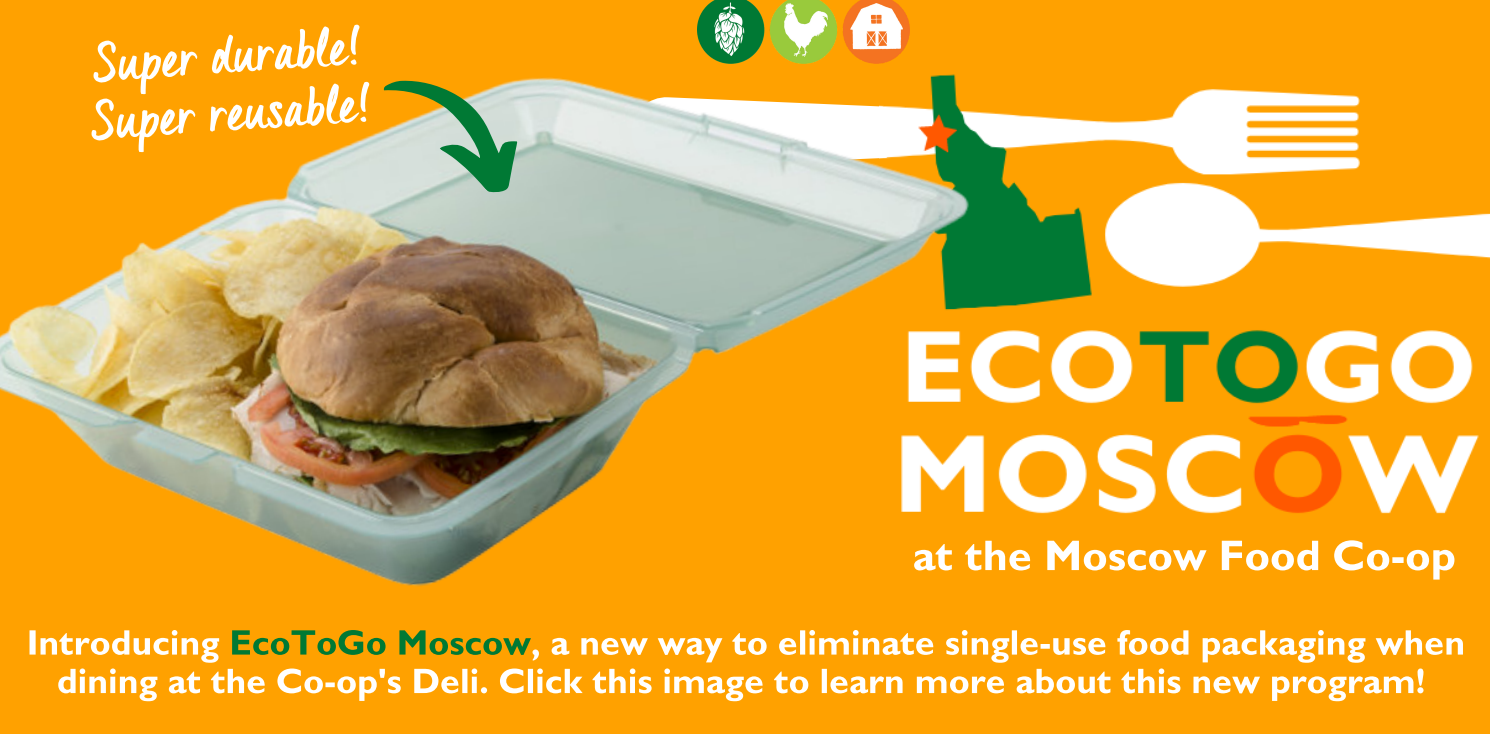Moscow Food Co-op History
Proprietors of the Good Food Store (from left): Jim Eagen, Katie Mosel, Rod Davis, and Dave Mosel. Phil Schofield photo.
It was August 1973 when our Co-op took root in Moscow. At that time, the nation was riveted by a Senate investigation into any illegal or unethical acts by the Nixon Presidential campaign related to the Watergate break-in at the Democratic National Committee office. Jim Croce’s recently released “Bad, Bad Leroy Brown” was in heavy rotation, spending two weeks at number one in July. And E. F. Schumacher’s “Small is Beautiful – Economics as if People Mattered” was hitting bookstores and deepening growing concern that modern economic practices are unsustainable.
It was a fertile time for growing a cooperative grocery store in Moscow. Counterculture ideas and increasing concern about soil, water, and air pollution were spurring the formation of natural food cooperatives all across the country in the late 1960s and early 1970s.
So too in Moscow, when friends Rod Davis, Jim Eagan, and Dave and Katie Mosel decided to start a natural foods store to address their concerns about rising food costs and the environmental impact of corporate food production. First called the Good Food Store, our founders opened our doors at 112 East Second Street with an inventory that consisted of peas, lentils, cheese, spices, and a few miscellaneous items. We were run entirely by volunteers, and in our first month sales totaled $126.88. In the second month sales grew to $1,000 – it was clear that Moscow wanted its Good Food Store!
Then, with 25 members and a few grants and individual loans in place, the Good Food Store officially became a nonprofit cooperative association with the state of Idaho on April 25th, 1974. Six locations and 41 years later, we’re now guided by more than 7,000 local owners who engage in the cooperative business model to build a socially responsible food and goods system. Throughout this history the Moscow Food Co-op has always been more than the buildings from which we’ve sold lentils and our pesto rolls. Our cooperative is the community of owners who sustain this store for the benefit of our broader community.
- by Joan Rutkowski, Owner Engagement Coordinator, for Rooted magazine (Winter 2014-2015)
THE MOSCOW FOOD CO-OP TIMELINE
Happy Co-opers gather at the Good Food Store, soon to become the Moscow Food Co-op.
1973: Rod Davis, Jim Eagan, and Katie and Dave Mosel open the Good Food store on 112 East 2nd St. First months sales $126.88. Second month’s sales: over $1000
1974: Co-op incorporates with 25 new members. A Community Action Agency grant helps the Co-op.
1975: Store moves to new location on 610 S. Main. Name officially changes to Moscow Food Co-op.
1976: The Co-op organizes Moscow’s Farmers Market to provide a meeting ground for buyers and sellers of fresh local produce. Eventually the City’s Arts Commission takes over and moves it to Friendship Square.
1978: The Co-op moves again to 314 S. Washington. We participate in the Renaissance Fair for the first time.
1980-1982: The Co-op faces stiff competition from area supermarkets. Managers are sent to business seminars and volunteers receive more training, and we get aggressive about broadening our appeal- cookware; socks, coffee and vitamins are sold.
310 W. 3rd, former home of Kentucky Fried Chicken
1989: We move to 310 W. 3rd, former home of Kentucky Fried Chicken, get our first parking lot, and business increases 40 percent.
1990: Co-op opens its own bakery, Upper Crust - The Wholegrain Bakery at the Moscow Food Co-op, on March 24, 1990. A second cash register is added. Staff increases to 20 employees and sales break $100,000 for December. Offices are moved upstairs.
1993: We celebrate our 20th anniversary. Staff and shoppers feel very cramped at present location, and the Board begins the search for a new facility.
1998: Co-op celebrates its 25th anniversary with a Taste Fair and a party. Negotiations are successful for a new location and Co-op owners lend the store over $77,000 to remodel & relocate.
Annie Hubble -- aka "fast food Annie"-- whips up a deli lunch special at the 310 W. 3rd location, circa 1990.
1999: Co-op re-opens in January at 221 E. 3rd St. (former home of Safari Pearl) with increased sales floor space, increased kitchen space, and a loading dock. Sales grow 38% in our first year at this location.
2005: As sales continue to grow, the Co-op negotiates a 15-year lease on the old Safeway building in the heart of downtown Moscow. The move to 121 East 5th St. is made in October; sales (and staff) immediately double.
2007: The Board of Directors adopts the “policy governance” framework and develops policy manual to better define and separate governance from daily operations.
Celebrating our new colors at our current and beloved home!
2008-2009: Margins drop and the Co-op is put on the National Cooperative Grocers Association watch list. Financial and managerial changes are made and systems are improved to help address concerns.
2014: The Board announces new Strategic Plan priorities for the Co-op to guide 2015-2020. Patronage Dividends for 2013 financial activity are shared with owners.
2015: A 10% discount for college students on Fridays is instituted. In April, the Co-op launches FLOWER, an owner discount program designed to directly increase food access and educational resources to those most in need. Those who qualify receive a 10% discount in the store. The Board and GM hold two Owner Forums -- one in Moscow and one in Pullman -- to discuss the process for opening a store in Pullman, address questions, and gather ideas. Store leadership continue to research locations and feasibility.
The Moscow Food Co-op's new satellite location on the University of Idaho campus.
Spring 2018: The Moscow Food Co-op takes its first step into growth by opening the Co-op on Campus, where students, staff, faculty, and more can buy packaged and co-op-made food, sodas, snacks and personal care products.
August 2018:The Moscow Food Co-op’s FLOWER program was expanded to better serve our community - now, owners who qualify for EBT/SNAP, WIC, Medicaid, or their state’s free school lunch program are eligible to get 20% off every shopping trip at the Co-op. As of December 2018, more than twice as many owners as before participate in FLOWER!
Fall 2019: The Moscow Food Co-op’s Dime in Time program receives record support from Co-op owners, raising over $800 for local nonprofits in just one month. Total donations from the last quarter of 2019 were the highest in Co-op history: 23,470 bags were saved and $2,347 was donated by our owners.
2020: The Moscow Food Co-op’s bakery department officially moves into the Moscow Cooperative Bakehouse, a large-scale bakery facility that will allow the bakery to produce your favorite breads and pastries at an even higher standard of quality. All sales of baked goods still take place at the Co-op downtown after being transported there from the bakery location.
March 2020: In response to the COVID-19 pandemic, the management team at the Co-op works with local software developer Cordelia to create the Cloud Co-op, and online shopping platform to allow shoppers to get the groceries and home goods they need delivered right to their car.
May 2021: The Co-op launches EcoToGo Moscow, a program to provide sturdy, reusable, dishwasher-safe containers for customers to use at the Deli & Salad Bar. Customers can fill a container with their favorite Co-op items, enjoy, then return their dirty container to our sanitizer and take a fresh one for their next meal.
April 1, 2022: Following the necessity of single-use items during the COVID-19 pandemic, the Co-op searches for ways to minimize continued single-use waste and promote more sustainable, reusable items throughout the store. The management team launched Change for Good, a program that stemmed from our former Dime in Time program but greatly expanded how customers are thanked for making sustainable choices at the Co-op. For each reusable grocery shopping tote, produce bag, EcoToGo box, bulk container, coffee mug or thermos you use for your shopping trip, shoppers have the opportunity to donate a 5¢ token to your choice between three community organizations. As our large paper grocery bags are made from 100% recycled paper and are fully compostable and recyclable, the Co-op also established a charge of 21¢ per paper bag (our manufacturing cost), focused on eliminating single-use items from the waste stream. After nine months of the Change for Good program, customers raised $3,504.05 for local nonprofit organizations.
January 2023: We kicked off a year of celebrating our 50th anniversary with the launch of specialty tie-dye t-shirts, custom tote bags, Nalgene bottles, and most importantly - a party! We gathered on January 19, 2023 to participate in the City of Moscow’s Artwalk. With free samples of locally-brewed beer, delicious wines, cheeses, and chocolates, we hosted friends from near and far for the first in a long line of celebratory events. At this event, the Marketing team announced the renaming of the gallery to the “Good Food Gallery” in homage of our store’s first name.
View of the gallery installation on January 19, 2023’s 50th Anniversary Kickoff event at the downtown store! Video by Kate Foutch of Looking Glass (Moscow, Idaho)








